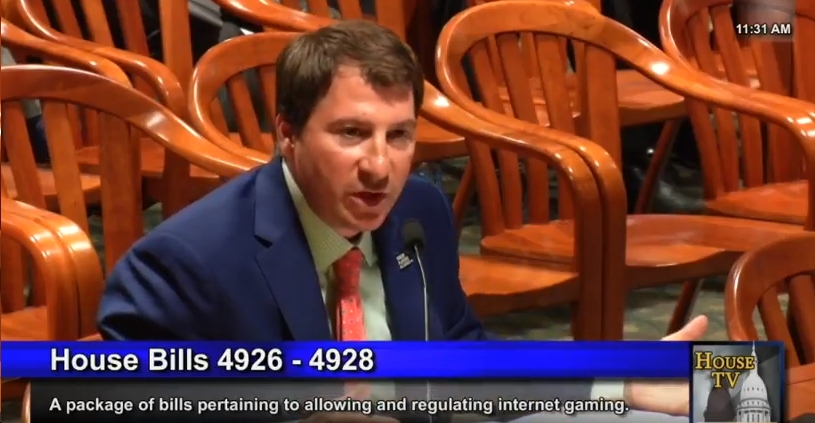
Online Poker in Michigan Now a Possibility for 2018 Following House Vote
Online poker in Michigan moved a step closer to becoming a regulatory reality following a House Regulatory Reform Committee vote.

Expert testimony from the PPA’s Executive Director John Pappas has helped a Michigan iGaming bill receive a positive House vote. (Image: YouTube/PPA/House TV)
The news was reported by the Poker Players Alliance’s (PPA) Vice President Rich Muny who, along with Executive Director John Pappas, supported the state’s iGaming bill.
Introduced by Committee Chairman Rep. Brandt Iden, House Bill 4926 sailed through a vote by a margin of 12 to 3.
While the positive vote is only the first step in the bill’s progression, it’s nonetheless a positive one.
A Positive Step but More Work to Do
Prior to Iden’s bill, Senator Mike Kowall introduced a similar proposal to the Senate. Although Kowall’s S 203 was deemed friendly to live venues, it required tribal casinos to relinquish their sovereign immunity.
Under Michigan state law, there is no general regulation for tribal casinos. Instead, the National Indian Gaming Commission and the government for each tribe regulate the industry.
Under this system, tribes sign individual compacts and, essentially, implement their own operating conditions.
S 203 required tribes to give up this sovereignty and, instead, come under a general set of regulations that would include iGaming. In contrast, Iden’s bill has provisions that would allow tribes to keep their independence and renegotiate their compacts so that they can offer online gaming.
Pappas Helps the Fight for Regulation
Prior to the vote, the PPA’s Pappas testified to the House Committee. Speaking after those that support Unlawful Internet Gambling Enforcement Act of 2006 (UIGEA), Pappas gave a measured account of the benefits regulation can offer.
The online poker advocate started his speech by dismissing the “rhetoric and fear mongering” produced by other speakers. He then went on to point out that those in support of UIGEA are linked to Sheldon Adelson and the Las Vegas Sands where online gaming is not only legal, but advertised.
“They’re coming here to Michigan to tell you all that you can’t do mobile gaming, but they’re ok doing mobile gaming in their own state. They’re also seeking to stop other states from offering mobile gaming and that doesn’t seem very fair,” Pappas said during the September hearing.
The Executive Director went on to ease any concerns that UIGEA usurps state’s rights, before outlining the financial upside of proper legislation. Pointing to data from the iDevelopment and Economic Association (iDEA), Pappas showed that New Jersey has produced $1 billion of economic output and created 3,500 jobs since regulation came into force back in 2013.
Based on the fact Michigan is 10 percent larger than New Jersey, Pappas suggested that its iGaming economy could be worth between $40 and $50 million annually.
With these facts in mind and a positive House vote, online poker fans in Michigan should have some hope heading into 2018.















0 Comments